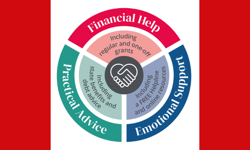"Decomposition is the reduction of a formerly living organism into simpler forms of matter such as phosphate of calcium or calcium carbonate - chalk."
So said Ruth, the mathematician, in an exquisitely mind-bending play at the Barbican Theatre in London recently. Which may seem a strange place to open a dialogue about "the evolving editorial process and what roles and processes are needed in the modern newsroom."
That is the publisher’s brief for this article, indicating a touching belief during this end-time era in the theory of evolution which, as I recall, says: "It is not the strongest of the species that survive, nor the most intelligent, but the one most responsive to change."
But bear with me, even those who find debates about the future role of journalists filling them with "utter boredom" (Loughborough still stinks, InPublishing, September/October, pages 48/49).
It’s worth reminding ourselves just what a publishing pickle we are in as we enter 2009 and ponder how many "modern newsrooms" there will be left to evolve once the grim reaper has done its work, courtesy of the open door offered by our unregulated "world class" financial services industries. And remembering, also, what director Ridley Scott had to say when he created his fell, acid-rain soaked, vision of the future for the film Blade Runner. "The future’s not new, it’s not modern", he said. "The future is old."
Big management
According to one analyst (Press Gazette, December 12), one third of the UK's regional newspapers, two national newspapers and half of the jobs in the regional media will disappear within five years.
Unhappily, the conclusion drawn from this unsettling prediction is that the remedy is to have even more big management. "A full relaxation of the barriers to consolidation is the only way to keep those jobs alive", the report opined.
Nor is this the first time this refrain has played since the economic chickens came home to roost last autumn.
"Taking a long-term view, consolidation would be a positive thing for readers and advertisers because it would produce a more robust industry", said one outgoing chief executive (Guardian, November 12).
Excuse me while I pick my jaw up from the floor. If these quotes had come from Tite Barnacle at the Circumlocution Office in Little Dorrit, we would be rolling around, lauding the BBC and the enduring qualities of 150-year-old satire.
Big management, particularly in the regional press, was spawned when the technological changes of the 1980s coincided with open season in the financial markets and produced a generation of "supergroups" which, according to conventional wisdom, would be more focused on their markets. Many applauded their arrival, providing a useful verdict on currently fashionable nostrums about the wisdom of crowds.
I was part of the Brahmin class in those days, and I recollect well one executive meeting where we were discussing the potential of small, digital, presses to deliver high quality, low-run, publications into diverse markets. A colleague (he went on to be a panjandrum with a reputation for "maximising shareholder value") whispered: "we’ll never have those; it’s not the sort of thing our stakeholders want."
He was right on that, but the shareholders were wrong. They should have put their money into Mr Merdle’s bank instead. It was the wonder of its age, just like those extravagant annual 30% profit margins of the past decade. They have gone; they will never return, and some might think that’s a good thing too. Some shareholders have taken an advantage, a sizeable number of executives have taken their bonuses, but now the butchers’ bill is being paid in lost titles and people scattered like chaff before the wind.
In the value-added section of the DVD of Series Five of The Wire (that’s the one about the Baltimore Sun, rather than the one which castigates City Hall, the education system and the police), there’s a useful feature called ‘The Last Word’ which debates the current condition of the press, and a veteran journalist provides a gruesome metaphor for the craft of journalism:
"It’s kind of like being gay in 1982. Half of the people I know are dying and being laid off."
Big management has had its chance, and it has failed. It has failed communities, readers, advertisers, many of its employees and is now in the process of failing its shareholders, the final conflict. It is cleaving around closing newspapers, sacking editors and staff, trying to pretend that newspapers don’t need sub-editors and, that if they do, those staff can be semi-detached from local knowledge, ethos, and community commitment.
Anyone who has ever supervised the fine detail of an outsourced publishing project will understand that it is not a trivial challenge unless you are prepared to sacrifice quality and accuracy. One problem is that too many decision-makers have nil experience at the sharp end of managing words against tight deadlines, which is why they speak so blithely about it. And if we changed the name from "sub-editor" to "content mediator" (so 21st century) we would be having a different debate.
Crystal ball
We are about to find out just how few journalists it takes to publish (it will be fewer than many people imagine) and it is in that context that the future of the next generation of newsrooms will be assessed. So let’s make some predictions:
1. Publications which survive will be high quality and highly differentiated, both online and in print. They will provide a distinctive voice and service, otherwise why would anyone buy them and read them? There’s plenty of free dross out there.
2. Newsrooms will be small. Those that occupy them will have high energy levels and be versatile in that they will possess writing, production, graphic, photographic and technical skills. Because they will be commissioning more material, they will run effective budgets and be excellent at project management. They will have a good repertoire of technological expertise and knowledge (social networks, feedback mechanisms, the various flavours of mobile comms. You know, all that stuff.)
3. The future for self-employed journalists, although they are the first casualties of a recession, will ultimately be brighter. Journalists will become more like actors. Sometimes they will be fully employed in a long run, sometimes they will be resting, sometimes they will be preparing. They will lose that individual and emotional commitment to a title which was such a competitive spur in times gone by, but that contract has largely been broken by forces and organisations beyond their control. Survivors will rise above that requirement and still deliver.
4. Newspaper production and web and mobile comms delivery must be integrated. But newspapers won’t, and shouldn’t, delude themselves that tacking video or citizen journalism onto their websites is going to make a difference to their business model. It won’t, and the amount of time spent worrying about this is out of all proportion to the potential benefit. It’s sexier than ink on paper. It holds out promise of jam tomorrow which is something that investors used to like. But now we are in an era where jam today, and the ability to keep putting that on the table, is a more important currency.
5. A prime function of a journalist is to mine into the abundance of information and make sense of it for the reader, thereby building a trust relationship. This is not a novel thought. I read it in Anthony Smith’s Goodbye Gutenberg more than thirty years ago when I was still producing daily newspapers in hot metal. But such is the modern glut of data, much of it unreliable and the product of spin, and pundits, and PR, that the service is more valuable than ever. To carry out this function effectively, journalists have to work across platforms, read voraciously, and be adept researchers. But to expect journalists to be equally proficient at presenting text, video, and audio is unrealistic, on the most generous construction of motives, and just plain stupid otherwise.
6. Another role for the modern journalist is the same as it ever was - to find out something that other people don’t know, and to give it an effective platform by telling a proper story. There remains a place in the modern newsroom for talented storytellers. They may be fewer than before, but their value is enhanced as a consequence. And when the journalist has exclusively unearthed something worth reading, is it not the height of madness for the publisher to give it away for nothing before the newspaper which has carried the costs of investigation has even appeared?
I’m with The Wire creator David Simon on this: "How much more contempt do you have to show for your product than to give it away for free on the internet. Every newspaper made the mistake of thinking that the internet was advertising for their product. It wasn’t. The story telling was the product."
Likely new entrants
Many established publishers believe that if they are not allowed to extend their monopolies then local communities will lose their titles. I think the reverse is possible ... that new ventures will emerge in place of the old behemoths; run by people with realistic expectations of what the economy and enterprise can stand; with local commitments rather than obligations to absentee shareholders (and, increasingly, absentee managers and editors).
Those ventures will start with the proposition that their role is to get stories and information in front of their audience in the most efficient and timely way possible. Sometimes it will be online, sometimes it will be print first. Always it will be with a personal familiarity with their markets. In a global economy that has melted down local accountability, this suddenly seems very attractive to consumers, whether they’re dealing with a bank manager or a publisher.
Technology is not an end in itself. It is an avenue. In schools, interactive white boards and computers were supposed to be the future. Walk into many of them (not the over-invested, politically-created, city academies) and you won’t find much chalk. But you will find the Mark II version, board pens. Oh, and lots of teachers dealing in ideas. No matter the choice of distribution channel, if content is not captivating, it’s just so much dead air. That’s why journalists are important.
In short, successful publishing will return to simpler, and older, verities. Cover prices should go down and stay down; hierarchies and tiers of management should be flattened or removed; regular and sustainable modest growth is to be trusted more than spectacular short-term profits; people should be rewarded for building long-term enterprise not annual results and businesses work best when they are close to their markets.
It has taken, and will take, the deepening crisis to remind us of this, and many of us will not survive. Like Sherlock Holmes, it may be our Last Bow...
"There's an East wind coming ... such a wind as never blew on England yet. It will be cold and bitter, Watson, and a good many of us may wither before its blast. But it's God's own wind none the less, and a cleaner, better, stronger land will lie in the sunshine when the storm has cleared."
FEATURE
A disappearing number
Newspapers are in a jam, in no small measure because of over consolidation, increasingly remote management and the pursuit of excessive and unsustainable profits. Allan Prosser urges publishers, in the current frenzy, to remember what’s important, what has value and what the communities we serve want from us.










